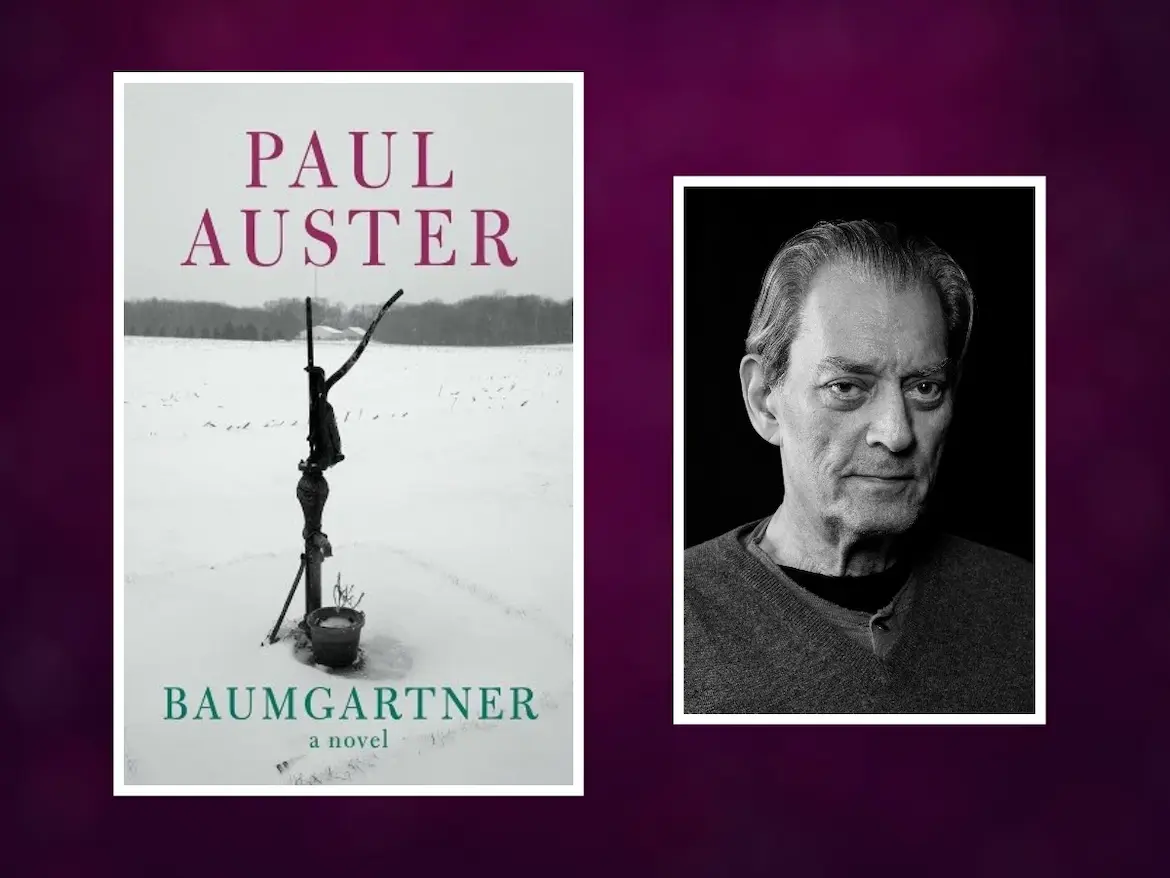A taut yet expansive novel of love, memory, and grief from Paul Auster, best-selling, award-winning author and “one of the great American prose stylists of our time”–New York Times
In This Spotlight On Baumgartner
About Baumgartner
Paul Auster’s brilliant eighteenth novel opens with a scorched pot of water, which Sy Baumgartner — phenomenologist, noted author, and soon-to-be retired philosophy professor – has just forgotten on the stove.
Baumgartner’s life had been defined by his deep, abiding love for his wife, Anna, who was killed in a swimming accident nine years earlier. Now 71, Baumgartner continues to struggle to live in her absence as the novel sinuously unfolds into spirals of memory and reminiscence, delineated in episodes spanning from 1968, when Sy and Anna meet as broke students working and writing in New York, through their passionate relationship over the next forty years, and back to Baumgartner’s youth in Newark and his Polish-born father’s life as a dress-shop owner and failed revolutionary.
Rich with compassion, wit, and Auster’s keen eye for beauty in the smallest, most transient moments of ordinary life, Baumgartner asks: Why do we remember certain moments, and forget others? In one of his most luminous works and his first novel since the Booker-shortlisted tour-de-force 4 3 2 1, Paul Auster captures several lifetimes.
Editorial Reviews for Baumgartner
Publishers Weekly
Auster (The Brooklyn Follies) offers a profound character study of a man whose advancing years are shaped by mourning and memory. Sy Baumgartner is a 70-year-old philosophy professor at Princeton who, at the novel’s outset, has spent the past decade grieving his beloved wife Anna’s death in a swimming accident.
Though he attends to a banal domestic routine, writes scholarly books, and even proposes marriage to a divorced colleague, Sy is so surrounded by effects of his old life with Anna (including manuscripts of her poetry, a book of which he shepherded into print posthumously) and so steeped in his reminiscences of her that at one point he becomes convinced she’s called him over a long-ago disconnected phone line to assure him “that the living and the dead are connected, and to be as deeply connected as they were when she was alive can continue even in death.”
Sy lives simultaneously in both the present and the past, and Auster navigates these two narrative tracks nimbly: an uncovered box of Anna’s postgraduate papers leads to a reverie about her and Sy’s courtship decades earlier; a present-day moment of absentmindedness conjures recollections of Sy’s multigenerational family. The effect builds to a beautiful approximation of memory’s fluidity and allure. This is one to savor.
Kirkus Reviews
Raised by a mother surnamed Auster in Newark, New Jersey, educated at Columbia University and in Paris, married to a translator—for the title character of his latest, Auster dips often into the autobiographical well.
As the book opens, S.T. Baumgartner, age 70, has been mourning his late wife, Anna, for 10 years when mishaps darken an otherwise ordinary day. He has a nasty fall, he learns that his cleaning lady’s husband has severed two fingers in a work accident, and he burns a pot he’s had since he first met his wife. Auster likes to stir up apprehension, but none of these misfortunes can match the frisson when a disconnected phone in his late wife’s study impossibly brings a call from her, telling him about the afterlife and how they remain connected.
As Baumgartner, amid typical worries about how much future he has, frequently revisits the past, the narrative of his falling for Anna and their marriage takes shape—yet the strange phone call also frees him to enjoy love again, with a colleague at Princeton. Then another woman appears and seems to promise a different sort of emotional investment, this one tied to his late wife.
Auster is not as textually tricky here as he has been in previous novels. He does bring back publisher Morris Heller and son Miles from Sunset Park (2010). He has Baumgartner working on “a serio-comic, quasi-fictional discourse on the self in relation to other selves,” which sounds like a study of Auster’s fiction. Baumgartner’s mind is full of late-life insights and angst, while his capacity for love provides a rich emotional seam. Auster packs a lot into this slim novel, including, alas, prose so prone to cliché that the mind winces.
An always intriguing writer mostly playing to his strengths.
Praise for Baumgartner
“The subject of lost loved ones and all that follows in the wake of such a loss is hardly unusual in contemporary literature, but Paul Auster’s Baumgartner is a worthy addition to the body of fiction that treats the subject. It’s a well-drawn portrait of a man wrestling with grief, and a sensitive character study that displays many of the qualities for which Auster’s been lauded in a long literary career… Baumgartner’s story is revealed in episodic fashion and with precise, observant, and sometimes touching detail… Poignant.”–Shelf Awareness
“Auster presents his eighteenth novel, a finely distilled tale of a charmingly self-deprecating and forthright intellectual and romantic… Auster’s portrait of a thoughtful man embracing loss and love is a gorgeous, subtly suspenseful revelation of the covert dramas of a contemplative, kind, and expressive life.”—Donna Seaman, Booklist (starred review)
About Paul Auster, Author of Baumgartner

Paul Auster is the bestselling author of 4 3 2 1, Sunset Park, The Book of Illusions, Moon Palace, and The New York Trilogy, among many other works. In 2006, he was awarded the Prince of Asturias Prize for Literature. His other honors include the Prix Médicis étranger for Leviathan, the Independent Spirit Award for the screenplay of Smoke, the Los Angeles Times Book Prize for Burning Boy, and the Carlos Fuentes Prize for his body of work. His novel, 4 3 2 1, was shortlisted for the Man Booker Prize.
He is a member of the American Academy of Arts and Letters and is a Commandeur de l’Ordre des Arts et des Lettres. His work has been translated into more than forty languages. He lives in Brooklyn, New York.
Titles by Paul Auster
Other LitStack Resources
Be sure and check out other LitStack Spotlights that shine a light on books we think you should read.
As a Bookshop, Amazon affiliate, LitStack may earn a commission at no cost to you when you purchase products through our affiliate links.


